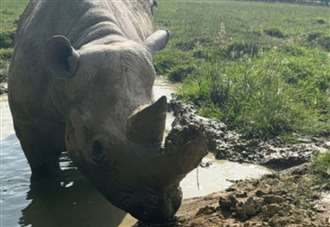The world’s first hand-reared black rhino at a Kent animal park has died at the age of 36, prompting tributes about her “fesity yet loving nature”.
Rosie moved to Port Lympne Safari Park, near Hythe, in 2011, quickly becoming a firm favourite among keepers and visitors.

A statement released by Port Lympne bosses announcing her death read: “From day one, Rosie made herself known with her feisty yet loving nature.
“She quickly chose her favourites among the new keeping team, typically preferring male keepers, and made her preferences very clear, showing her full force to those she didn’t take a liking to.
“Many will remember that she was never especially happy with anyone entering her house, [instead] greeting them with a huff and a roar until food or scratches were offered, at which point she would soon soften.
“Rosie was often used as an example of how quickly a rhino can switch from being sweet to displaying their fierce and powerful nature – almost a rite of passage for new staff.
“She has always been a true character, known and loved by so many of our staff and guests.
“Whether you were lucky enough to meet our girl in person, saw her from a distance, or heard one of the countless stories about her, she left a mark on each and every one of us.

“Her sass, her huffs, her squeaks, and her loving nature touched so many, and she will never be forgotten.”
Rosie was born at London Zoo in November 1988 to mum, Stumpy, and dad, Fred.
She moved to Chester Zoo in 2000 and then to Port Lympne 11 years later, meeting the likes of Sienna Miller when the actress visited the park in August 2016.
However, her life was almost cut short just days after being born.
Weighing in at a paltry 17kg – compared to a typical calf weight of 30kg – her mum was unable to feed her due to Rosie’s weakness and small size.
She was removed from her parents the following day and put under the care of keepers, who bottle-fed Rosie with her mother’s milk every two hours.

However, after a few days without a suckling calf, Stumpy’s milk ran out.
With all previous attempts to hand-rear black rhinos proving unsuccessful, her keepers worked with experts at Zoological Society of London to develop a substitute for Stumpy’s milk.
Tolerating her new synthetic composition and neonatal requirements, she rapidly grew to become the first successfully hand-reared black rhino in history.
Rosie’s treatment has since been used to successfully raise and ultimately save several other black rhinos worldwide.
Following her death, tributes poured in online for her – whose species has a life expectancy of between 35 and 40 years.

Helen Kinghorn said: “I saw you at London Zoo the night you were born. It was wonderful to see you again last November.
“You have touched many human hearts.”
Georgie Clements added: “Being lucky enough to work with her in my five years volunteering was always so much fun and her sass and huffs as we entered the house always used to make me smile.
“Rest in peace Rosey Pose – it’s been a pleasure and an honour.”
Black rhinos are listed as critically endangered by the IUCN Red List of Threatened Species, although numbers have risen from about 2,500 in the wild during the 1990s to about 6,000 today.
According to the WWF, the species can weigh between 1,700 and 3,000 pounds.
Black rhinos are also browsers, rather than grazers, meaning they are herbivores who do not feed on low-growing vegetation.
They have two horns, which grow continually from the skin at their base throughout the rhino’s life.
The front horn is longer than the rear horn, averaging about 19 inches long.
